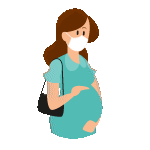Are you pregnant? Do you feel hungry all the time? Are you trying to figure out what to eat that will taste good while being healthy? You may get this advice often to eat nutritious foods during pregnancy. For new mommies to be, it is important to have a healthy and balanced diet for a healthier and stress-free pregnancy. During this phase, pregnant women feel starved and have food cravings at off times of the day. Your body will start going through changes over nine months as the baby develops in your womb.
Medical studies suggest that a pregnant woman needs to consume 350 to 500 calories per day. It is necessary to get enough nutrition and energy to stay strong. While building the diet chart, focus on the whole foods with higher amounts of nutrition, including:
- Protein
- Vitamins A, D, and C
- Calcium
- Iron
- Iodine
- Carbohydrates
- Folic acid
- Fibers and fluids
- Minerals
But, what exactly should you eat to stay healthy during pregnancy? In this blog, we have prepared a list of superfoods and ingredients to keep up with your crazy cravings.
1. Eggs
Eggs are inexpensive and easy to cook superfoods. Whether you have an omelette or boiled, eggs are the ultimate health food that contains prenatal protein. They are a great source of proteins, calcium, vitamins, and minerals.
A whole egg contains 147 milligrams of choline, which plays a vital role in the baby’s brain development. It prevents the development of brain and spine abnormalities. It is highly recommended to take 450 milligrams of choline per day.
The best dishes that you can prepare from Eggs- are Eggs Bhurji, Egg Omelette, Egg Dosa, and Egg Paratha apart from having them boiled or poached.
2. Fruits
Fruits can be consumed every day throughout your pregnancy. Certain fruits contain a good amount of healthy carbs, vitamins, and fibers. So, they must be in your daily diet plan to keep you and your baby healthy. Here is the list of the fruits which shouldn’t be missed:
- Orange is a great source of vitamins C. It acts as an antioxidant and prevents neural tube defects.
- Mangoes are high in vitamin A which lowers the risk of respiratory infections and any complications during birth.
- Avocado is a good source of vitamin k, choline, and other minerals. It has high magnesium and potassium, relieves nausea, and reduces leg cramps.
- Lemons are the best vitamin C source to stimulate the digestive system. Smelling lemons can help in relieving pregnancy-related nausea.
- Bananas: They are another source of potassium, vitamin C, vitamin B6, and fiber. It prevents constipation that may be caused because of a low-fiber diet, iron, or uterine pressure on the intestines.
- Berries: They can be blueberries, raspberries, and strawberries, which are enriched in carbohydrates, vitamin C, fiber, and folate. Berries can provide energy and complex carbohydrates to nourish your baby.
3. Green leafy Vegetables
There is no surprise that Green leafy vegetables top the list. These superfoods are packed with vitamins and minerals beneficial for new moms. You may not love to eat them, but you can’t have a meal without them. Adding a serving of veggies to your diet is an efficient way to reduce acidity and constipation during pregnancy.
The benefits included are:-
- Vitamin C, K, and A
- Iron,
- Folate
- Potassium
- Calcium
- Fiber
Leafy and tasty vegetables can also prevent the risk of low birth weight. They are also rich in antioxidants to balance your digestive system all along. Taste these prenatal superfoods vegetables or include them with other dishes, including broccoli, spinach, Kale, Beetroot, and sweet potatoes.
4. Dairy Products
You need extra protein and calcium to help the baby grow inside the womb. Dairy products should be in your dietary plan. They also contain high-quality proteins such as casein and whey. Dairy products are the best way to get calcium, phosphorus, B vitamins, magnesium, and zinc.
Dairy Products should be on your diet list, including:
- Curd: It contains probiotics that help to reduce the risk of vaginal infection, allergies, and preeclampsia. Curd is a great source of protein and calcium. You can eat plain curd, sweet curd, buttermilk, and curd rice.
- Paneer: Paneer is the best protein source in the Indian household kitchen. It contains protein, calcium, Vitamins B, Zinc, and magnesium. You can enjoy dry or gravy with rice or chapati.
- Milk: It is complete with calcium and micronutrients. Consuming milk also helps in maintaining the weight and length of your baby.
5. Legumes
During all three trimesters, it is important for you and your baby to consume folate. So, in a day, you should have 600 micrograms of folate which plays an important role in a pregnant diet.
They are plant-based superfoods that contain fiber, protein, folate, and calcium. It comprises chickpeas, soybeans, peas, beans, peanuts, and lentils.
Legumes help to reduce any neural problems and low birth weight. Beans and lentils are good sources of Vitamin B.
Legumes are a high fiber source to be incorporated into your everyday meals. Some recipes are peas pulao, chickpea chat, bean veg, and peas soup.
6. Dried Fruits and Seeds
Dried fruits contain a high amount of calories, fiber, and various vitamins. They contain the same amount of nutrition as fresh fruit. You can intake one serving of dried fruits in the morning. Some of them contain sugar also, so try to avoid the candied varieties.
It may also help in increasing the calories and nutrients. But, consuming over one serving is not good for you. They also provide vitamins and minerals, such as folate, iron, and potassium.
Nuts and seeds are the best sources of dense nutrition, such as almonds, walnuts, dates, chia seeds, watermelon seeds, and pumpkin seeds. It will also help reduce the risk of premature labor and aid in the baby’s development.
7. Whole Grains
Whole Grains are filled with fiber, vitamins, and proteins. It includes quinoa, brown rice, wheat berries, and barley.
Some whole grains, like oats and quinoa, also have a sufficient amount of protein. They cover the needs of vitamins, fiber, and magnesium. The list of whole grains includes amaranth, brown rice, and ragi.
- Dalia: It can be consumed for high-fiber content and is best for pregnant ladies with gestational diabetes. You can make khichdi, upma, kheer, and pulao.
- Ragi: It is generally a source of Iron, calcium, and fiber, essential for the baby’s growth development. Some recipes must try : ragi dosa, roti, idli, cake, ladoo, and porridge.
8. Fatty Fish
Fishes like salmon and tuna contain proteins and omega-3 fatty acids. It is essential for a pregnant woman as they help in the development of your baby's brain and eyes. Salmon is a safe food for expectant mummies to eat as it contains low mercury.
The Takeaway
Eating the right foods is important to support your health and your baby’s development. Fresh superfoods help you handle pregnancy with a healthy body and mind. Add these superfoods to your diet plan, so you try to eat them regularly. A small serving of each food can give you a complete fill of nutrition and have a healthy pregnancy.
Mamy Poko Pants wishes you a safe and healthy pregnancy as you embark on a nine-month journey to bring a precious new human into the world.
FAQ's
Q. Why is a balanced diet important during pregnancy?
Ans.A balanced diet provides essential nutrients like protein, calcium, iron, and folic acid that support your baby’s growth and development. It also boosts your energy, strengthens immunity, and helps manage common pregnancy discomforts like constipation and fatigue. Eating well ensures a healthier pregnancy and smoother delivery experience.
Q. How many extra calories do I need while pregnant?
Ans.Pregnant women typically need an additional 350 to 500 calories per day, especially during the second and third trimesters. These calories should come from nutrient-dense foods like fruits, vegetables, lean proteins, dairy, and whole grains to support the baby’s growth and maintain your own energy and health.
Q. Are eggs safe and healthy during pregnancy?
Ans.Yes, eggs are safe and highly nutritious during pregnancy. They’re rich in protein, calcium, and choline, which support your baby’s brain development. Ensure eggs are thoroughly cooked to reduce the risk of foodborne illness. You can enjoy them boiled, scrambled, or in dishes like omelettes and egg parathas.
Q. What fruits are best to eat while pregnant?
Ans.Fruits like oranges, bananas, berries, mangoes, and avocados are excellent choices. They’re rich in vitamins, fiber, and antioxidants. These help relieve constipation, boost immunity, and reduce pregnancy-related symptoms like nausea. Include a variety of fruits daily to cover different nutrient needs and satisfy sweet cravings healthily.
Q. Why are green leafy vegetables important in pregnancy?
Ans.Green leafy vegetables like spinach, kale, and broccoli are packed with essential nutrients—iron, calcium, folate, and fiber. They help prevent anemia, reduce constipation, and support the baby’s brain and bone development. Include a variety in your meals daily for optimal digestive health and pregnancy nutrition.
Q. What are the benefits of dairy products during pregnancy?
Ans.Dairy products like milk, curd, and paneer are rich in calcium, protein, and probiotics. They support your baby’s bone development and help maintain your own bone strength. Curd also supports digestion and reduces the risk of infections. Choose pasteurized and low-fat dairy for safe and balanced nutrition.
Q. Can I eat legumes while pregnant?
Ans.Absolutely. Legumes—like lentils, chickpeas, beans, and peas—are plant-based powerhouses packed with protein, fiber, folate, and iron. Folate is vital for preventing neural tube defects. Legumes also aid digestion and keep you full longer, making them a great addition to your diet during all pregnancy trimesters.
Q. Are dried fruits and seeds good for pregnant women?
Ans.Yes, in moderation. Dried fruits and seeds like almonds, walnuts, dates, and chia seeds offer concentrated nutrients, including iron, potassium, fiber, and healthy fats. They’re great for energy, digestion, and preventing anemia. Avoid candied varieties and limit portions to avoid excess sugar or calorie intake.
Q. Why should I include whole grains in my pregnancy diet?
Ans.Whole grains like brown rice, oats, and ragi provide complex carbs, fiber, and essential vitamins like B-complex. They keep your energy stable, reduce constipation, and support fetal development. They’re also great for managing gestational diabetes. Include items like dalia, roti, or porridge in your meals.
Q. Is it safe to eat fish during pregnancy?
Ans.Yes, but choose low-mercury options like salmon and tuna. Fatty fish provide protein and omega-3 fatty acids crucial for your baby’s brain and eye development. Limit fish to 2-3 servings per week and avoid raw or high-mercury varieties like swordfish or king mackerel.




















